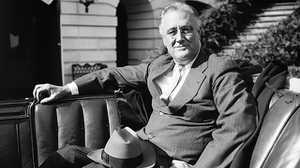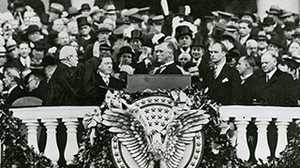Letter from Joseph C. Grew to Cordell Hull
A letter to Roosevelt's secretary of state describes the Japanese military.
Tokyo, May 11, 1933
My dear Mr. Secretary:
For your information I am enclosing a copy of a special report from the Military Attaché of the Embassy, describing the Japanese Army's methods of increasing its strength by means of voluntary contributions from the people and indicating, in the closing paragraphs, the tremendous military power which Japan is developing. This report gives an admirable picture of one phase of Japan's fighting strength, but I would like to describe to you, briefly the whole picture as I see it; that is, the strength of the Japanese nation as a whole and particularly the strength of the combined Japanese fighting machine. Japan is so often spoken of as a small, over-crowded nation , cooped up within the confines of a few small islands, without natural resources, and largely dependent upon foreign sources for its foodstuffs, that people in other countries sometimes fail to appreciate the facts and to realize the actual and potential power of these people.
The Japanese Empire is not a small country, as compared with the countries of Europe, at least. The Empire itself, without "Manchukuo," has an area considerably greater than that of France or Germany and much more than that of either Spain or Italy. Including the area of "Manchukuo," which to all practical purposes is under Japanese control, the total area of Japan and its dependencies is greater than that of France, Germany, Spain, Switzerland, Belgium, Netherlands and Denmark combined. The population of the Japanese Empire proper is 90 millions; with that of "Manchukuo" it is around 120 millions, or nearly the same as that of the United States. And these people (or that part of them which is of the Japanese race) are intelligent, industrious, energetic, extremely nationalistic, war-loving, aggressive and, it must be admitted, somewhat unscrupulous. So Japan cannot be considered as a small or a weak country. Nor is it living on the verge of starvation, keeping the wolf from the door by super-human exertions. Japan can and does raise enough foodstuffs (even without "Manchukuo") to feed the population quite comfortably, and in years of large harvests is embarrassed by the surplus of foodstuffs. However, if the population continues to increase at its present rate, the food problem will become real and pressing within the next generation. Moreover, the nation has developed its industries in recent years until it is able to supply itself with all of the necessities of life, and can build all the ships, and make all the airplanes, tanks, guns, ammunition, chemicals etc., needed to wage a severe war, if it is not too protracted. Furthermore, it has large reserves of war material, such as petroleum, nitrates, etc., not produces within the country.
So much for the country and its people and industries. Turning to the armed forces of the country, it is my opinion that Japan probably has the most complete, well-balanced, coordinated and therefore powerful fighting machine in the world today. I do not refer to the army only, but to the combination of sea, land and air forces, backed up as they are by enormous reserves of trained men, by industrial units coordinated with the fighting machine and by large reserves of supplies. The different units if Japan's machine may be exceeded in size by equivalent units of other nations, but taken as a whole the machine, I believe, is equal, if not superior, to that of any other nation. Thus, France has a large navy, but a much smaller army. The United States is weaker that Japan on land and about equal on the sea, but is probably potentially superior in the air. Of course, it would take a group of naval, military, aviation and industrial experts to calculate accurately the relative strengths of the fighting machines of the world, but I think that if such could be done, the strength of Japan's combined machine would give a shock to many people. The machine probably could not stand a protracted, severe war, as industrial supplies would become exhausted, but for a quick, hard push I do not believe that the machine has its equal in the world.
Relative to the strength which could conceivably be brought against it, I consider Japan's fighting machine immeasurably stronger than any other. Thus, France's army is not large if all the forces which could be brought against it in Europe are considered, nor is Great Britain's navy large when compared with the combined naval forces of the European Powers. But Japan has no potential enemy is Asia capable of defeating her fighting machine as a whole, not even Soviet Russia it is believed, while American and European countries are too far from Japan to offer any serious menace. Japan's relative strength, therefore, is much greater than that of any other Power.
However, although we are faced with this tremendously powerful fighting machine across the Pacific, I think that our anxiety can be lessened by the fact that this machine does not seem to be designed for aggressive action outside of the Far East. The Japanese fighting machine, unless I am very much mistaken, is designed for the purpose of keeping Western nations from interfering while Japan carries out its ambitions in Asia, whatever they may be. It is true that the Japanese fighting forces consider the United States as their potential enemy, and sometimes direct their maneuvers against a potential American attack be sea or air, but that is because they think that the United States is standing in the path of the nation's natural expansion and is more apt to interfere with Japan's ambitious than are the European nations.
Whether directed at us or not, however, I believe that it would be well for us o keep this tremendous Japanese fighting machine in mind when discussing disarmament.
More than the size of the nation or the strength of its fighting machine, however, the thing which makes the Japanese nation actually so powerful and potentially so menacing, is the national morale and esprit de corps-a spirit which perhaps has not been equaled since the days when the Mongol hordes followed Genghis Khan in his conquest of Asia. The force of a nation bound together with great moral determination, fired with national ambition, and peopled by a race with unbounded capacity for courageous self-sacrifice is not easy to overestimate.
Respectfully yours
Joseph C. Grew






